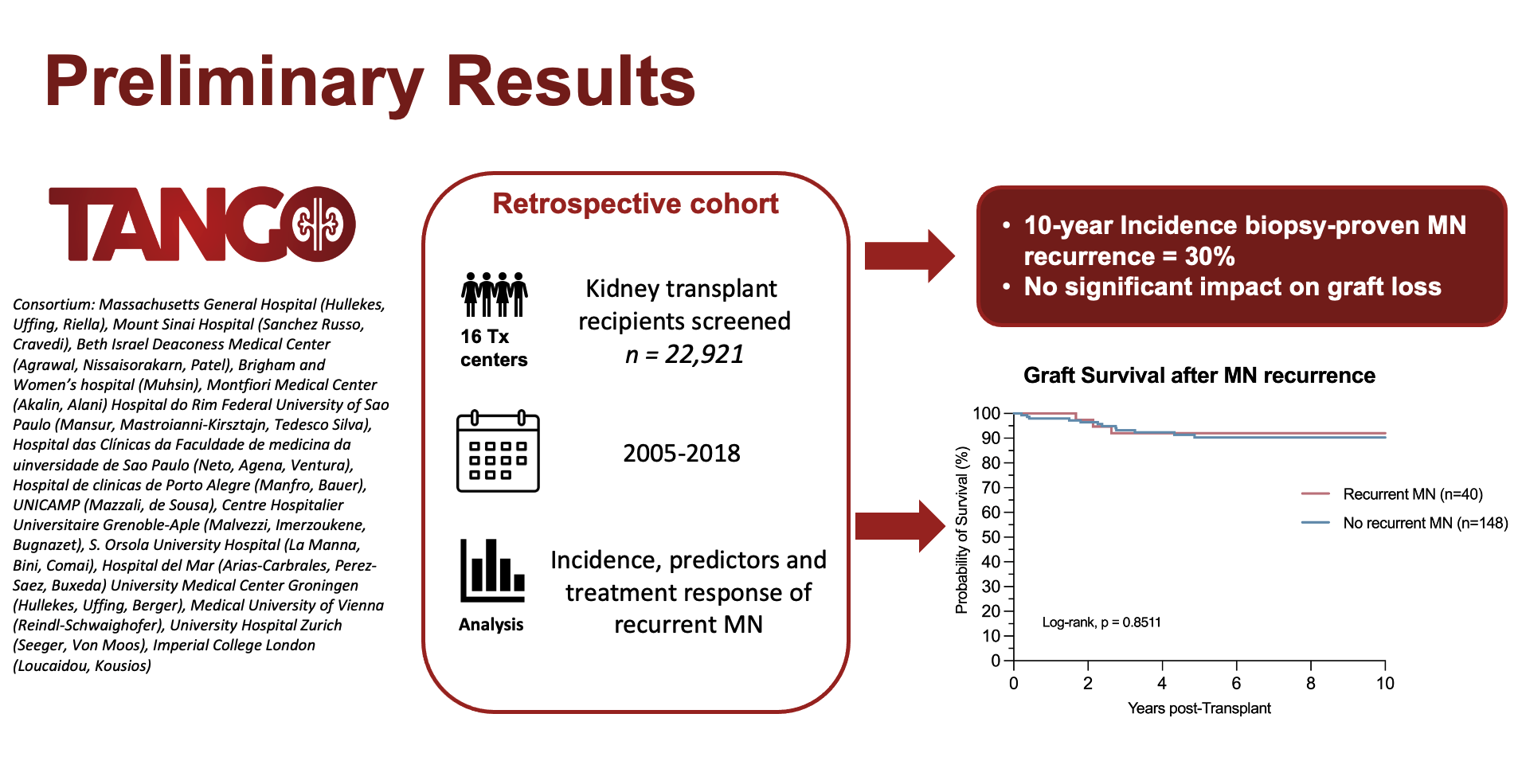Recurrence of Membranous Nephropathy After Kidney Transplantation – TANGO Consortium
1Harvard Medical School, Boston, MA, 2Mount Sinai, New York, NY
Meeting: 2022 American Transplant Congress
Abstract number: 501
Keywords: Glomerulonephritis, Graft survival, Kidney transplantation, Recurrence
Topic: Clinical Science » Kidney » 49 - Recurrent Kidney Disease & Genetics
Session Information
Session Name: Recurrent Kidney Disease & Genetics
Session Type: Rapid Fire Oral Abstract
Date: Tuesday, June 7, 2022
Session Time: 5:30pm-7:00pm
 Presentation Time: 5:50pm-6:00pm
Presentation Time: 5:50pm-6:00pm
Location: Hynes Room 310
*Purpose: Membranous nephropathy (MN) is a leading cause of nephrotic syndrome in adults. Several breakthroughs in recent decades, including the identification of anti-PLA2R Abs, aided in optimizing treatment regimens for patients with MN. However, MN often leads to kidney failure and frequently recurs in the transplanted kidney. The incidence and impact of recurrent MN on allograft survival remains unclear as most studies have been limited to single-centers and small sample size.
*Methods: As part of The Post-Transplant Glomerular Disease (TANGO) Consortium, we conducted a multicenter, retrospective cohort study to investigate MN recurrence post-transplantation, including its incidence, predictors, treatment regimens and treatment response. 16 transplant centers across three continents enrolled patients with biopsy-proven MN prior to transplant, who were transplanted between 2005-2018. Both baseline and longitudinal patient information relevant to the study were entered into an online database. The diagnosis of recurrence was based on graft biopsy.
*Results: Among 22,921 patients screened, 188 kidney transplant recipients with MN were included. The median time from diagnosing MN in the native kidney to end-stage renal disease was 86 months [IQR 60-136.5]. The cumulative incidence for recurrence was 30% [95%CI: 17-42] at 10 years post-transplant with a median time to recurrence of 4.9 [IQR: 2.2-7.6] years. The risk of graft loss was not significantly different for those with and without a recurrence. After patients got diagnosed with recurrent MN, additional renin-angiotensin-aldosterone blockade was initiated in 73% (35/48) of the cases. Patients with MN recurrence that received B-cell depletion therapy achieved 60% (13/22) remission (either complete or partial), as opposed to 38% (10/26) for those who did not receive supplemental B-cell depletion therapy.
*Conclusions: In this large multicenter cohort, MN recurred in 30% of transplant recipients, but did not affect graft survival. Patients receiving B-cell depletion therapy for recurrent MN had a higher rate of remission.
To cite this abstract in AMA style:
Hullekes F, Uffing A, Riella L, Cravedi P. Recurrence of Membranous Nephropathy After Kidney Transplantation – TANGO Consortium [abstract]. Am J Transplant. 2022; 22 (suppl 3). https://atcmeetingabstracts.com/abstract/recurrence-of-membranous-nephropathy-after-kidney-transplantation-tango-consortium/. Accessed July 14, 2025.« Back to 2022 American Transplant Congress

